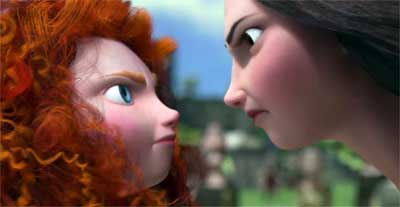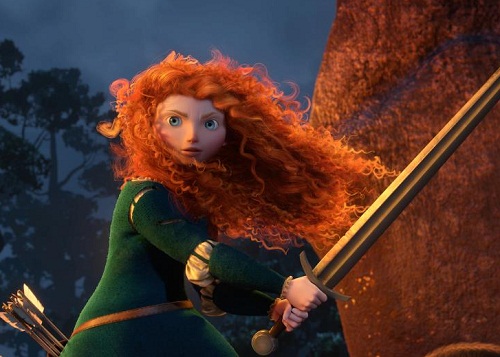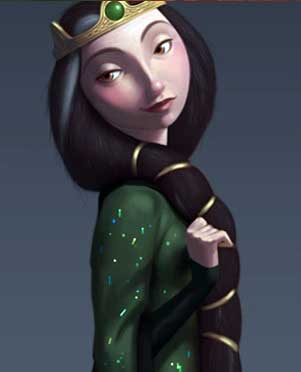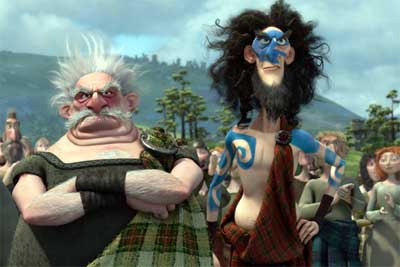Film (2012)
Studio: Pixar
Distributed by Walt Disney Pictures
Release date: June 10, 2012
Directed by Mark Andrews, Brenda Chapman, Steve Purcell
Story by Brenda Chapman
Screenplay by Mark Andrews, Steve Purcell, Brenda Chapman, Irene Mecchi
Original Music by Patrick Doyle
Film Editing by Nicholas C. Smith
Produced by Pete Docter, Mary Alice Drumm, John Lasseter, Katherine Sarafian, Andrew Stanton
With Kelly Macdonald (Merida), Billy Connolly (Fergus), Emma Thompson (Elinor), Julie Walters (The Witch)

© 2012 Disney/Pixar. All Rights Reserved.
The scene is ancient, tribal Scotland.
A young princess, Merida (Kelly Macdonald), is independent, courageous and willful. Her parents, the boisterous and very large King Fergus (Billy Connolly) and the most composed and elegant Queen Elinor (Emma Thompson) are trying to keep the peace in a country of opposing tribes. The parents have arranged for three tribes to bring potential suitors to Merida, but she will have none of it.
There are certainly no Prince Charmings in the bunch, but, despite that, Merida does not want her destiny dictated. She seeks a magical change in her mother’s stance on this, which results in a sequence of challenges that lead to some eventual awareness on the parts of mother and daughter about how to navigate their relationship and their responsibilities.

© 2012 Disney/Pixar. All Rights Reserved.
Is “Merida” really the name of a Scottish princess? I know it is the name of the big city in the Yucatan Peninsula of Mexico – but it seems unlikely here. Oh well.
Though this film has its charms and is basically well meant and reasonably entertaining, there is something in the conception of this tale, which seemingly has some noble feminist motivations, which does not seem fully realized and gives me pause.
Presumably the title – Brave – indicates something about the character of this young woman, but the meaning actually seems more complex and ambiguous in a not completely satisfying way.
Theoretically this is an empowerment story about a young woman. Oddly, however, Merida is empowered and self-assured from the beginning. It seems to be her parents’ – and particularly, her mother’s – view of Merida’s duty to marry one of the doofus princes that provides the main challenge to her independence. They – not Merida – have to grow to understand that the best marriages are not forced but found.
As well, along the way, Merida has to understand something of her role as a future queen, which she does rise to admirably. But, without the whole drama that ensues here, it seems that this young woman with gumption and self-possession would, in fact, do so anyway. This drama, in effect, does nothing much for her character development.

© 2012 Disney/Pixar. All Rights Reserved.
Even so, the drama causes a tightening of ties between mother and daughter. Something about adolescent maturation and parental understanding emerges from this tale, but the significance emerges in an elliptical way, and it is considerably less potent than it might be.
In the end, the notion of bravery applies both to Merida’s native self-possession and to her mother’s capacity to yield and see things anew. It is a nice hybrid idea, in principle, but the haziness of the intent and the ambiguous implications of the title do not give a resounding sense of import, which left me wondering about, rather than feeling, its signficance.
I saw the movie twice and felt the same way about it both times. It was not clear either time why it was that what Queen Elinor goes through causes her to change her views. Indeed she faces challenges of identity – in fact, this represents the main action of the film. But, when the time comes for her to have her say, there is no connection between those and her changed views on the issue of an arranged marriage for Merida. She changes, but why? Without a clear sense of that, her display of this change of heart seems contrived, not genuinely brave.
Underlying this character transformation is a general image of releasing one’s inner creature to express itself more spontaneously; by doing so, and by relaxing social constraint to some degree, one can find the route to familial and social happiness. It is a nice underlying message, but the significance of this – related to Queen Elinor’s transformation – does not, in the end, sit very satisfyingly with the story of her daughter’s struggle for her own independence.
Merging those two quite different senses of bravery might have seemed like a good thematic idea, but, in the end, the result is more confusing than poetic.

All the men in the story, by the way, are buffoons, and it is only the measured presence of mother, and then daughter, which can bring any order into their raucous embattlements.
This does not seem quite right, somehow. And, in the end, it does not exactly inspire a feminist tale. The notion remains that women’s roles are very different from those of men’s. Though this is a myth set in ancient times, I am not sure that is the right extraction of images to inspire young women in our own time.
The first time I went to this movie I took my twelve year old niece and she liked in pretty well. But once we started talking about its story and ideas, she also saw some of the ambiguities, and the appeal became somewhat hazier, though the general sense of appreciation remained.
– BADMan
Leave a Reply